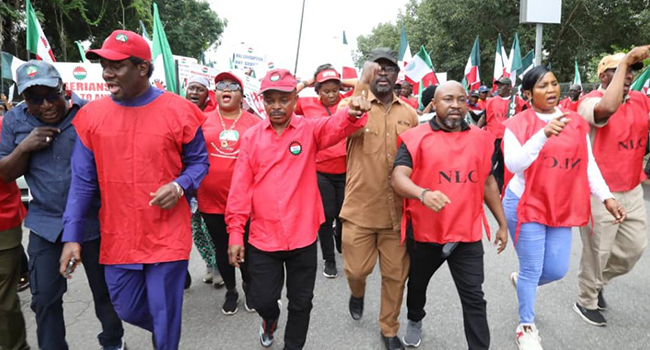
LATEST: FG, LABOUR IN EMERGENCY MEETING AS STRIKE GROUNDS ECONOMIC ACTIVITIES
The Federal Government of Nigeria has called labor leaders to a conference in Abuja, the nation’s political capital, as the organized labor movement’s statewide walkout over a new minimum wage for workers is impeding economic activity in the country.
The Nigeria Labour Congress (NLC) President, Joe Ajaero, and his Trade Union Congress (TUC) counterpart, Festus Osifo, are present at the meeting, which is now in progress.
The administration’s representatives include Nkiruka Onyejeocha, the minister of labor; Mohammed Idris Malagi, the minister of information; and George Akume, the secretary to the government of the federation.
Businesses, airports, universities, hospitals and power supply were affected as Labour began an indefinite strike on Monday over Labour’s demand for a new minimum wage.
The Minimum Wage Act of 2019 was signed by former President Muhammadu Buhari in April of 2019, but not all governors are paying the current wage award, according to the NLC and TUC, who claimed that the current minimum wage of ₦30,000 could no longer support the well-being of the average Nigerian worker. Every five years, the Act should be reviewed to ensure that it still meets the needs of workers in the modern economy.
Afterwards, labor gave the federal government until May 31 to set the new minimum wage. The country’s labor unions announced on May 31 that a nationwide walkout will start on Monday, June 3, 2024, in protest of the government committee’s inability to reach a consensus on a new minimum wage and the cancellation of the increase in electricity rates.
Labour turned down three proposals from the government during the fruitless negotiations, the most recent being N60,000. After that, the TUC and the NLC withdrew from the talks and insisted on ₦494,000 as the new minimum wage.
Sunday night’s last-minute negotiations between labor leaders and the National Assembly leadership ended in failure when Organized Labor declared that the industrial action would not be reversed.
Wale Edun, the Coordinating Minister of the Economy and Minister of Finance, stated that the demands of the workers are unaffordable.
The minister, who was a guest on Channels Television’s Sunday Politics programme said, “It is difficult because the worker deserves his wage, and given what is going on, they deserve a change and, by law, every five years, and maybe, we shouldn’t have to wait five years every time to set a new wage scale. The fact is that by law, it is a minimum wage.
“So, you are not setting a wage for Federal Government workers, for example. In a Federation, you are setting a minimum figure that states must pay, that local governments must pay, that the private sector must pay, that small businesses must pay.
“It is a fixed figure, not a scale. So, there are elements of how we have set the minimum wage in the past, particularly what we called the consequential adjustment, which, given what Labour is asking today, will be unaffordable across the board.
“We have to focus on the fact that once it is enshrined in law, everybody that falls into the category of having to pay the minimum wage must pay it. Therefore, the affordability has to be taken into account.
“We probably have to also take into account the fact that there are other ways of supporting the cost of living of workers other than wage scale.”
